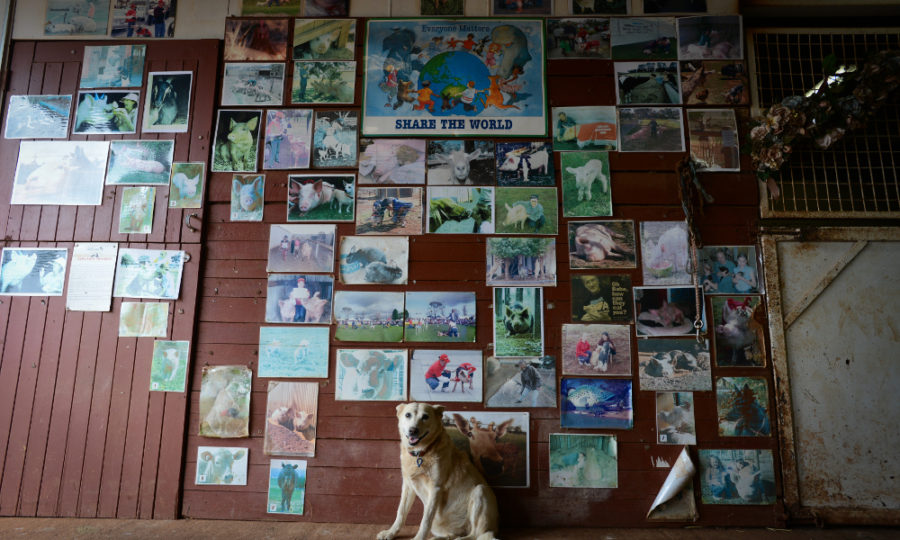I’ve written before about my admiration for and struggles with some of Donna Haraway’s work in animal philosophy, and about how helpful I find relational theory. After working through When Species Meet, I decided to teach a philosophy seminar on how relational theory has informed animal ethics! The course revolves around When Species Meet and Sue Donaldson and Will Kymlicka’s 2011 book, Zoopolis: A Political Theory of Animal Rights. Although these texts represent different philosophical orientations toward animal philosophy, both texts are committed to the premise that relationships are constitutive of the human animal condition. Moreover, both recognize that we human animals co-create the world with other animals and animal communities.
The relational turn in animal ethics
The first section of the course focuses on a “relational” turn in animal ethics. As I mention in my post about my queer theory class, it’s hard to leave things off a reading list. The following is certainly not exhaustive of relational approaches to animal philosophy. Rather, it represents texts that I have been dwelling with over the past year or so.
- Limitations of Non-Relational Approaches (Zoopolis chapter 1, “Introduction” and Deane Curtin, “Toward an Ecological Ethic of Care”)
- Relational Entanglements (Lori Gruen, “Entanglements” in Entangled Empathy and When Species Meet chapter 1, “When Species Meet”)
- Revising Animal Rights (Zoopolis chapter 2, “Universal Basic Rights for Animals” and chapter 3, “Extending Animal Rights via Citizenship Theory”)
- Decolonizing Animal Ethics (Billy-Ray Belcourt, “Animal Bodies, Colonial Subjects” and Margaret Robinson, “Animal Personhood in Mi’kmaq Perspective”)
- Making Analogies between Animal Liberation and Other Liberatory Projects (When Species Meet chapter 6, “Able Bodies and Companion Species”; Eva Feder Kittay, “The Personal is Philosophical is Political: A Philosopher and Mother of a Cognitively Disabled Person Sends Notes from the Battlefield”; and the following essays from the Sistah Vegan anthology: Tashee Meadows, “Because They Matter”; Tara-Sophia Bahna-James, “Journey Toward Compassionate Choice: Integrating Vegan and Sistah Experience”; A. Breeze Harper, “Introduction: The Birth of the Sistah Vegan Project”)
A side note
I recognize that the latter topic is controversial. In a recent interview with Our Hen House, Aph Ko referred to the question of comparing liberatory projects as boring and as a symptom of white veganism’s preoccupation with being white. I’m sympathetic to Ko’s argument, but included this topic nonetheless. Eva Kittay is visiting UWaterloo this fall, and she makes claims about inappropriate comparisons between justice for persons with cognitive disabilities and justice for animals. I wanted us to engage with her work since she’ll be on campus.
Communities
The second section of the course focuses on various human/animal communities.
- Citizenship Relations with Domestic Animals (Zoopolis chapter 4, “Domesticated Animals within Animal Rights Theory and chapter 5, “Domesticated Animal Citizens”)
- Human-Dog Relationships (Tara Sophia Bahna-James, “Terror” and When Species Meet chapter 4, “Examined Lives” and chapter 8, “Training in the Contact Zone”)
- Relations between Human-Animal and Wild Animal Communities (Zoopolis Chapter 6, “Wild Animal Sovereignty”)
- Techno-Relations (When Species Meet chapter 3, “Sharing Suffering”; chapter 5, “Cloning Mutts, Saving Tigers”; and chapter 9, “Crittercam”)
- Denizenship Relations with Liminal Animals (Zoopolis chapter 7, “Liminal Animal Denizens”)
- Parting Bites (Zoopolis chapter 8, “Conclusion” and When Species Meet chapter 11 “Becoming Companion Species in Technoculture” and chapter 12 “Parting Bites”)
A parting bite for this post
One of the assignments my students will do asks them to reflect on relational theory, their beliefs, and their practice. One option for this assignment is to practice a “meatless Monday” and write philosophical journals on the experience over the course of the semester. This option may be challenging for people not used to cooking without using animal products (assuming they cook in the first place). I never really learned to cook meat, but I do remember the challenge of learning how to shift from away from dairy-centered meals when I went vegan.
Here’s a recipe I make quite often: tahini sauce. I didn’t know what tahini was until I started making my own hummus! It’s fairly easy to find in Waterloo (I’ve bought it at Valu Mart, the Superstore, Central Fresh Market, and Vincenzo’s), as I imagine it’s fairly easy to find anywhere. Check the Mediterranean/Middle-Eastern, health food, or peanut and spreads aisles. Usually, I have tahini sauce with rice and veggies (cooked or raw), but it’s also a great pasta topping, with falafel and pita, or as a salad dressing! I have a broccoli casserole recipe that I created for holiday meals that recalls the broccoli-cheese casserole my mom always made.
Tahini sauce
My go-to recipe is from the Fresh cookbook.
- 2 cloves garlic, minced (or you could use garlic powder)
- 1/2 cup chopped parsley (I often leave this out, but it’s yummy in!)
- 2 tbsp. lemon juice (about half a lemon, but adjust to taste)
- 1/2 tsp. sea salt
- 2/3 cup water (adjust to the consistency you desire)
- 1/2 cup tahini
In a blender (or I use a food processor), blend garlic, parsley, lemon juice, and salt. Then add tahini and water and blend until smooth. (Sometimes I just dump everything in and blend, and it’s always okay). Don’t have a blender or food processor? I used to whisk the ingredients in a bowl with a fork, and that worked fine. If you go that route, garlic powder may be a better option.
As always, let me know what you think–either about the course or about tahini sauce!
Photo credit
Rescue dog and images of rescued farm animals. Jo-Anne McArthur / We Animals. Please support Jo-Anne’s work.
